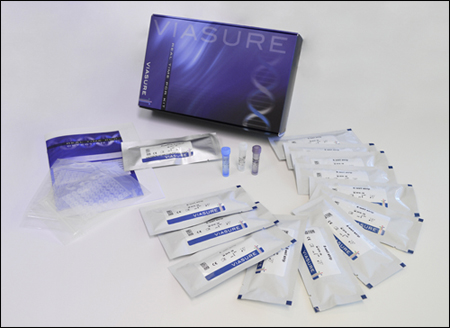
VIASURE Real Time PCR Detection Kits
Helicobacter pylori

Description
VIASURE Helicobacter pylori Real Time PCR Detection Kit is designed for specific identification of Helicobacter pylori in gastric tissue biopsies from patients with signs and symptoms of Helicobacter pylori infection.
This test is intended for use as an aid in the diagnosis of Helicobacter pylori infection in humans in combination with clinical and epidemiological risk factors.
DNA is extracted from gastric tissue biopsies, multiplied using Real Time amplification and detected using specific primers and a fluorescent reporter dye probe for Helicobacter pylori.
Specifications
Information
The genus Helicobacter belongs to the family Helicobacteriaceae of the order Campylobacterales. Helicobacter pylori (H. pylori) is a gram-negative microaerophilic spiral-shaped bacterium, which is able to colonize the mucus layer of the human stomach and the upper part of small intestine (duodenum).
More than half of the world population is estimated to be infected with H. pylori, but most individuals are asymptomatic. The new infections might be due to direct person-to-person transmission, via either an oral-oral, fecal-oral route or both. Nevertheless, the role of coccoid form of H. pylori as a vehicle of infection from food and water sources should not be discarded. H. pylori is involved in the pathogenesis of atrophic gastritis, gastroduodenal ulcer, gastric cancer and gastric mucosa-associated lymphoid tissue (MALT) lymphoma.
At present, several diagnostic assays for H. pylori detection are available and grouped as “invasive” or “noninvasive”, but none of them can be considered as gold standard alone. Invasive methods include histology, culture and rapid urease testing, which require gastric biopsy specimens obtained by gastroduodenoscopy. Non invasive approaches include fecal antigen detection, serologic testing, and urea breath testing among others.
Urease is an important factor for the maintenance and virulence of the bacterium in the gastric mucosa. It is composed of two structural subunits encoded by genes, ureA and ureB, which have been frequently employed as target genes for the specific detection of Helicobacter pylori.
